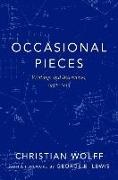Read more
With Occasional Pieces, composer Christian Wolff brings together a collection of his most notable writings and interviews from 1950 to the present, shining a new light on American music of the second half of the twentieth century. Included are profiles of Wolff's experimentalist contemporaries, including John Cage, Morton Feldman, David Tudor, and Merce Cunningham.
About the author
Christian Wolff is a former Professor of Classics and Music at Dartmouth College, now a full-time composer and sometime performer. Born in Nice, France, he has lived and worked primarily in the United States since 1941, where he studied composition briefly with John Cage in 1950. He was a pioneering member of the "New York School" of composition in the 1950's and 60's and with Cage, Morton Feldman, Earle Brown and David Tudor produced a range of experimental music that maintains a notable and still evolving presence. Wolff has received awards and grants from the American Academy and National Institute of Arts and Letters, the Ford Foundation, DAAD Berlin, the Asian Cultural Council, the Fromm Foundation, the Foundation for Contemporary Performance Arts and the Mellon Foundation, and is a member of the Akademie der Kuenste in Berlin and the American Academy of Arts and Sciences.
George E. Lewis is Edwin H. Case Professor of American Music at Columbia University.
Summary
With Occasional Pieces, composer Christian Wolff brings together a collection of his most notable writings and interviews from 1950 to the present, shining a new light on American music of the second half of the twentieth century. Included are profiles of Wolff's experimentalist contemporaries, including John Cage, Morton Feldman, David Tudor, and Merce Cunningham.
Additional text
For those who claim that writing about music is a futile enterprise, and that perhaps a composer should not write about their own music, let this book dispel any doubts. Christian Wolff's life, music, and thought exemplify how complexity, imagination, vision, and an ear for sounds previously unheard can be combined seamlessly, creating a body of work unlike any other before (and, I expect, after) him. For those of us who have always wondered: 'how does he do it?', this new book provides an essential and welcome piece of the puzzle. We still won't know, but the clarity, depth and honesty of Wolff's writing brings us, tantalizingly, a bit closer to the answer.

